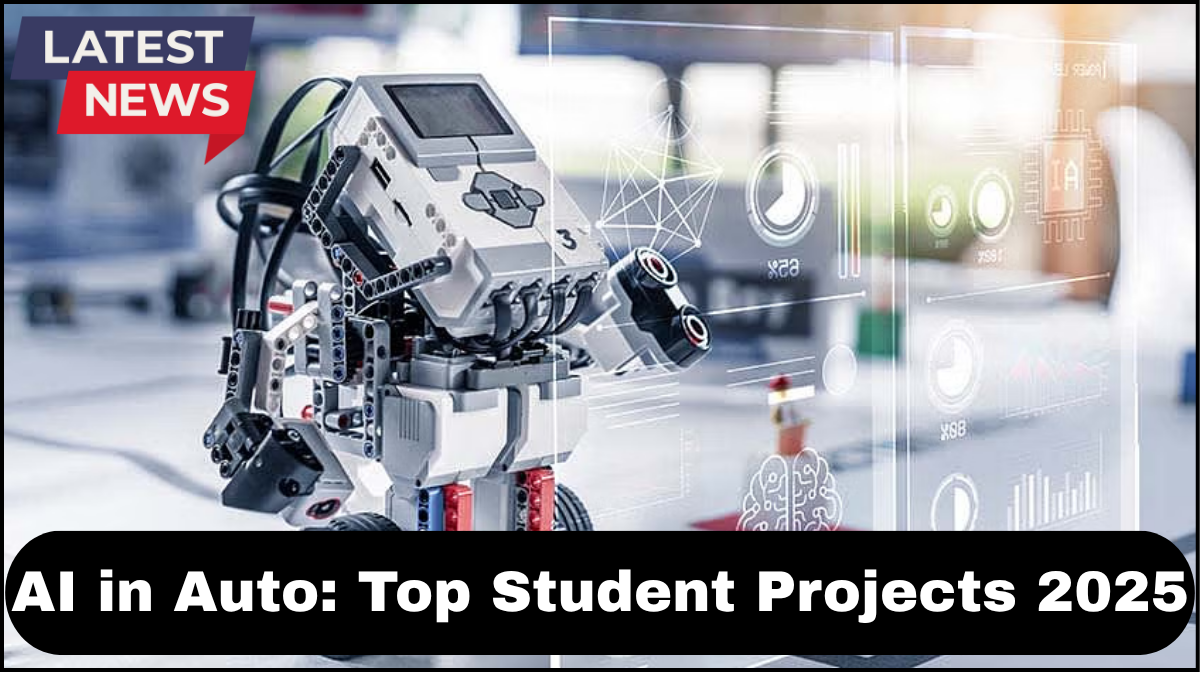Artificial Intelligence (AI) is transforming the automotive industry at lightning speed—and the next wave of innovation is coming straight from the classroom. AI Auto Projects 2025 are showcasing the ingenuity, technical skill, and problem-solving prowess of students from universities and tech institutes around the world. These forward-thinking prototypes and models aren’t just academic exercises—they’re setting the stage for real-world breakthroughs in autonomous driving, predictive maintenance, smart safety systems, and beyond.

Below are some of the most promising and impressive student AI in vehicles projects that are making headlines in 2025.
Smart Emergency Braking Systems Using Predictive AI
One standout project comes from a group of engineering students at the University of Michigan. They designed a smart emergency braking system that uses AI-powered visual recognition and real-time environmental data to predict when a collision is likely—even before the human driver reacts.
The AI system analyzes factors like road conditions, object velocity, and behavioral patterns of nearby vehicles. Their model achieved a 20% faster reaction time compared to existing commercial systems, pointing toward a future where cars will not only see what’s in front of them but also think ahead.
AI-Powered Driver Fatigue Monitoring
At the Technical University of Munich, a team of graduate students focused on tackling one of the biggest hidden threats on the road: driver fatigue. Their AI auto project employs computer vision and biometric sensors to monitor eye movement, blink rates, head position, and micro facial expressions.
If signs of drowsiness or distraction are detected, the system alerts the driver and can even suggest safe stop locations. This project stands out for combining safety with machine learning in a way that respects privacy while increasing road security.
Autonomous Parking with Swarm Intelligence
A group of robotics students in South Korea developed a prototype for autonomous parking using principles of swarm intelligence, inspired by how birds or ants work collectively. Their AI model allows multiple vehicles to coordinate and optimize parking availability in tight urban areas without centralized control.
This project demonstrated how decentralized AI logic could reduce congestion and improve efficiency in high-traffic parking lots, a problem often overlooked by larger commercial systems.
Predictive Maintenance Bots for Electric Vehicles
Students at the Indian Institute of Technology (IIT) developed a predictive maintenance platform tailored for electric vehicles. Their AI model uses historical sensor data from EV batteries, motors, and brake systems to forecast when components will likely fail.
This AI Auto Project 2025 leverages neural networks to anticipate service needs weeks in advance, potentially saving EV owners thousands in unexpected repairs. It also offers integration with mobile apps, allowing drivers to book servicing automatically.
Conversational AI for Vehicle-Human Interaction
At Stanford University, a multidisciplinary team of linguists and engineers built a conversational AI model to improve in-car voice assistants. Unlike basic command-response systems, their model understands context, emotional tone, and can handle multi-layered queries.
For example, if a driver says, “I’m feeling tired, what’s nearby to get coffee and recharge?”, the assistant responds with options for both the driver and the electric vehicle, showing seamless integration of conversational intelligence into the vehicle experience.
Vehicle-to-Vehicle AI Communication Protocols
A breakthrough project from students at the University of Tokyo introduced a protocol for AI-based communication between autonomous vehicles. This student AI in vehicles initiative uses machine learning to allow cars to “negotiate” merges, lane changes, and intersections cooperatively—without relying on human input or external signals.
Early testing in simulated environments showed a significant decrease in traffic incidents and smoother traffic flow when multiple AI vehicles operated under this cooperative model.
Why These Projects Matter
The significance of these AI Auto Projects 2025 goes beyond student recognition or innovation competitions. Many of these projects are being incubated by major automotive firms, integrated into open-source platforms, or fast-tracked into full-scale testing.
They represent a shift in how the next generation of engineers and scientists are shaping the future of mobility. With AI at the wheel—sometimes literally—the automotive industry is entering a smarter, safer, and more personalized era.
FAQs
What are AI Auto Projects 2025?
AI Auto Projects 2025 are innovative, student-led initiatives that explore the application of artificial intelligence in the automotive sector. These include projects focused on autonomous driving, vehicle safety, predictive maintenance, and smart user interfaces.
Why are student AI in vehicles projects important?
These student projects often push boundaries and explore areas that commercial companies might overlook. They serve as testing grounds for bold ideas and often lead to real-world applications that reshape automotive standards.
Are these student projects used in real vehicles?
Some of them are. Many AI Auto Projects 2025 are being adopted by startups or licensed by car manufacturers for further development, especially those showing strong feasibility and safety outcomes in trials.
How can students get involved in AI automotive innovation?
Students can start by joining university research labs, entering AI or robotics competitions, or collaborating with interdisciplinary teams on open-source vehicle software platforms.
click here to learn more